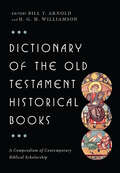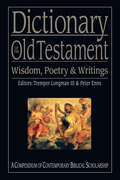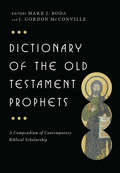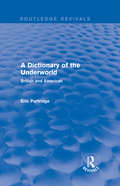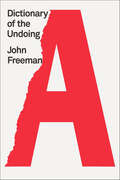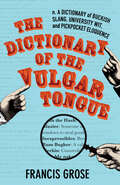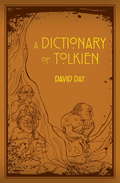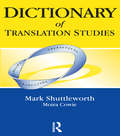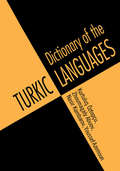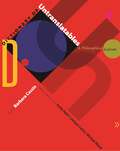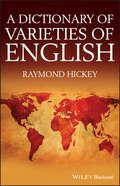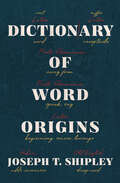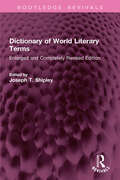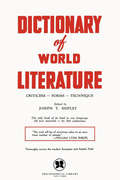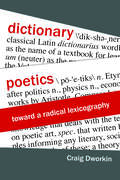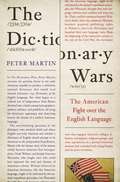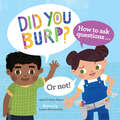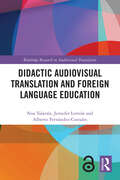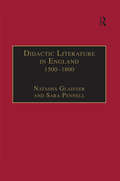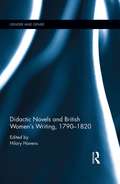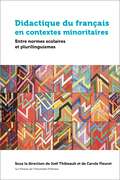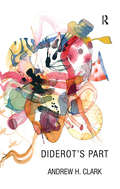- Table View
- List View
Dictionary of the Old Testament: Historical Books (The IVP Bible Dictionary Series)
by Bill T. ArnoldDictionary of the Old Testament: Historical BooksDictionary of the Old Testament: PentateuchDictionary of the Old Testament: Historical BooksDOTHB.DOTHBDOTHBDOTHB
Dictionary of the Old Testament: A Compendium of Contemporary Biblical Scholarship (The IVP Bible Dictionary Series)
by Tremper Longman IIIChristianity TodayThe Old Testament books of wisdom and poetry carry themselves differently from those of the Pentateuch, the histories or the prophets. The divine voice does not peal from Sinai, there are no narratives carried along by prophetic interpretation nor are oracles declaimed by a prophet. Here Scripture often speaks in the words of human response to God and God's world. The hymns, laments and thanksgivings of Israel, the dirge of Lamentations, the questionings of Qohelet, the love poetry of the Song of Songs, the bold drama of Job and the proverbial wisdom of Israel all offer their textures to this great body of biblical literature. Then too there are the finely crafted stories of Ruth and Esther that narrate the silent providence of God in the course of Israelite and Jewish lives.Dictionary of the Old Testament: Wisdom, Poetry Writings.Coverage of each biblical book includes an introduction to the book itself as well as separate articles on its ancient Near Eastern background and its history of interpretation. Additional articles amply explore the literary dimensions of Hebrew poetry and prose, including acrostic, ellipsis, inclusio, intertextuality, parallelism and rhyme. And there are well-rounded treatments of Israelite wisdom and wisdom literature, including wisdom poems, sources and theology. In addition, a wide range of interpretive approaches is canvassed in articles on hermeneutics, feminist interpretation, form criticism, historical criticism, rhetorical criticism and social-scientific approaches.Dictionary of the Old Testament: Wisdom, Poetry WritingsTremper Longman III and Peter E. Enns edit this collection of 148 articles by 90 contributors on Job, Psalms, Proverbs, Ecclesiastes, Song of Songs, Lamentations, Ruth and Esther.
Dictionary of the Old Testament: Prophets (The IVP Bible Dictionary Series)
by Mark J. Boda2013 ECPA Book Award finalistDictionary of the Old Testament: Prophets
A Dictionary of the Underworld: British and American (Routledge Revivals: The Selected Works of Eric Partridge)
by Eric PartridgeFirst published in 1949 (this edition in 1968), this book is a dictionary of the past, exploring the language of the criminal and near-criminal worlds. It includes entries from Australia, New Zealand, Canada and South Africa, as well as from Britain and America and offers a fascinating and unique study of language. The book provides an invaluable insight into social history, with the British vocabulary dating back to the 16th century and the American to the late 18th century. Each entry comes complete with the approximate date of origin, the etymology for each word, and a note of the milieu in which the expression arose.
Dictionary of the Undoing
by John FreemanFor John Freeman—literary critic, essayist, editor, poet, “one of the preeminent book people of our time” (Dave Eggers)—it is the rare moment when words are not enough. But in the wake of the election of 2016, words felt useless, even indulgent. Action was the only reasonable response. He took to the streets in protest, and the sense of community and collective conviction felt right. But the assaults continued—on citizens’ rights and long-held compacts, on the core principles of our culture and civilization, and on our language itself. Words seemed to be losing the meanings they once had and Freeman was compelled to return to their defense. The result is his Dictionary of the Undoing.From A to Z, “Agitate” to “Zygote,” Freeman assembled the words that felt most essential, most potent, and began to build a case for their renewed power and authority, each word building on the last. The message that emerged was not to retreat behind books, but to emphatically engage in the public sphere, to redefine what it means to be a literary citizen.With an afterword by Valeria Luiselli, Dictionary of the Undoing is a necessary, resounding cri de coeur in defense of language, meaning, and our ability to imagine, describe, and build a better world.
The Dictionary of the Vulgar Tongue: A Dictionary of Buckish Slang, University Wit, and Pickpocket Eloquence (Hesperus Classics)
by Francis GroseDo you know your abbess from your elbowshaker? Originally printed as a guide to street slang for men of quality, this reference guide will enrich your vocabulary with vulgar witticisms fashionable more than 200 years ago.The avowed purpose of this dictionary was to give men "of fashion" an insight into the inappropriate language of the street. Read in modern times it is by turn uproariously funny and deeply confusing and yet certain truths have remained—the need for the mot juste has not diminished. Many of the words should be brought back into common parlance forthwith: we have no term for the "admiral of the narrow seas," one who from drunkenness vomits into the lap of the person sitting opposite to him. We have perhaps less use for a word for "dobin rig" or "Stealing ribbons from haberdashers early in the morning or late at night; generally practised by women in the disguise of maid servants." Learn how the Georgians and early Victorians would insult each other and find out how some of today's words and derivations have come about in this quirky little volume.
A Dictionary of Tolkien: A-Z (Tolkien Illustrated Guides #1)
by David DayArranged in a handy A-Z format, A Dictionary of Tolkien explores and explains the creatures, plants, events and places that make up these strange and wonderful lands. It is essential reading for anyone who loves Tolkien's works and wants to learn more about them. This book is unofficial and is not authorised by the Tolkien Estate or HarperCollins Publishers.
A Dictionary of Tolkien: An A-Z Guide to the Creatures, Plants, Events and Places of Tolkien's World (Tolkien #1)
by David DayArranged in a handy A-Z format, A Dictionary of Tolkien explores and explains the creatures, plants, events and places that make up these strange and wonderful lands. It is essential reading for anyone who loves Tolkien's works and wants to learn more about them. This book is unofficial and is not authorised by the Tolkien Estate or HarperCollins Publishers.
Dictionary of Translation Studies
by Mark ShuttleworthPublished at a time of unprecedented growth of interest in translation, the Dictionary of Translation Studies aims to present the insights of a number of different approaches to translation in an unbiased, non-partisan way. With more than 300 articles, this essential volume provides the reader with a snapshot of a rapidly developing discipline, based on work produced in serveral languages. With a clear, easy-to-follow layout, the Dictionary provides a comprehensive and highly accessible survey of key terms and concepts (such as Abusive Translation, Equivalence, Informationsangebot, Minimax Principle, Texteme and Thick Translation), types of activity (Autotranslation, Dubbing, Signed Language Interpreting), and schools and approaches (Leipzig School, Manipulation School, Nitra School). Each term is presented within the context in which it first occurred and is given a definition which is both clear and informative. Major entries include a discussion of relevant viewpoints as well as comments on how the usage and application of the term have developed subsequent to its coining. In addition, all entries provide suggestions for further reading, and there is an extensive bibliography included at the end. This is an indispensable tool for anyone studying or teaching translation at university level.
Dictionary of Turkic Languages
by Zhoumagaly Abuov Nasir Kambarov Youssef AzemounThis multi-language dictionary covers the eight major Turkic languages: Turkish, Azerbaijani, Turkmen, Uzbek, Uighur, Kazakh, Kirgiz, and Tatar. 2000 headwords in English are translated into each of the eight Turkic languages. Words are organized both alphabetically and topically. Original script and Latin transliteration are provided for each language. For ease of use, alphabetical indices are also given for the eight languages. This is an invaluable reference book for both students and learners and for those enaged in international commerce, research, diplomacy and academic and cultural exchange.
Dictionary of Untranslatables: A Philosophical Lexicon (Translation/Transnation #35)
by Barbara CassinCharacters in some languages, particularly Hebrew and Arabic, may not display properly due to device limitations. Transliterations of terms appear before the representations in foreign characters.This is an encyclopedic dictionary of close to 400 important philosophical, literary, and political terms and concepts that defy easy—or any—translation from one language and culture to another. Drawn from more than a dozen languages, terms such as Dasein (German), pravda (Russian), saudade (Portuguese), and stato (Italian) are thoroughly examined in all their cross-linguistic and cross-cultural complexities. Spanning the classical, medieval, early modern, modern, and contemporary periods, these are terms that influence thinking across the humanities. The entries, written by more than 150 distinguished scholars, describe the origins and meanings of each term, the history and context of its usage, its translations into other languages, and its use in notable texts. The dictionary also includes essays on the special characteristics of particular languages--English, French, German, Greek, Italian, Portuguese, Russian, and Spanish.Originally published in French, this one-of-a-kind reference work is now available in English for the first time, with new contributions from Judith Butler, Daniel Heller-Roazen, Ben Kafka, Kevin McLaughlin, Kenneth Reinhard, Stella Sandford, Gayatri Chakravorty Spivak, Jane Tylus, Anthony Vidler, Susan Wolfson, Robert J. C. Young, and many more.The result is an invaluable reference for students, scholars, and general readers interested in the multilingual lives of some of our most influential words and ideas.Covers close to 400 important philosophical, literary, and political terms that defy easy translation between languages and culturesIncludes terms from more than a dozen languagesEntries written by more than 150 distinguished thinkersAvailable in English for the first time, with new contributions by Judith Butler, Daniel Heller-Roazen, Ben Kafka, Kevin McLaughlin, Kenneth Reinhard, Stella Sandford, Gayatri Chakravorty Spivak, Jane Tylus, Anthony Vidler, Susan Wolfson, Robert J. C. Young, and many moreContains extensive cross-references and bibliographiesAn invaluable resource for students and scholars across the humanities
A Dictionary of Varieties of English
by Raymond HickeyA Dictionary of Varieties of English presents a comprehensive listing of the distinctive dialects and forms of English spoken throughout the contemporary world.Provides an invaluable introduction and guide to current research trends in the fieldIncludes definitions both for the varieties of English and regions they feature, and for terms and concepts derived from a linguistic analysis of these varietiesExplores important research issues including the transportation of dialects of English, the rise of 'New Englishes', sociolinguistic investigations of various English-speaking locales, and the study of language contact and change.Reflects our increased awareness of global forms of English, and the advances made in the study of varieties of the language in recent decadesCreates an invaluable, informative resource for students and scholars alike, spanning the rich and diverse linguistic varieties of the most widely accepted language of international communication
Dictionary of Word Origins (Barnes And Noble Digital Library)
by Joseph T ShipleyThis extensive reference volume presents the etymological history of thousands of English words. The story of how words come to be is the story of how humans think, and how we fashion our civilizations. Words can be the product of long and intertwining histories, migrations from other languages, or new coinages of science or slang. This diversity of origins is part of what gives the English language its beauty and power. In Dictionary of Word Origins, etymologist Joseph T. Shipley provides a fascinating window into the evolution of modern English, from the onomatopoetic aspect of &“abash&” to the animalistic origins of &“zodiac.&”
Dictionary of World Literary Terms: Enlarged and Completely Revised Edition (Routledge Revivals)
by Joseph T. ShipleyFirst published in 1970, Dictionary of World Literary Terms brings together in one volume authoritative definitions of literary terms, forms and techniques, figures of speech and detailed notes on the history and development of the literatures and literary movements of the world. Arranged in alphabetical order for easy use, the entries range from anti-hero to zeugma, from classicism to the New Criticism, and from esoteric or archaic terms to contemporary theatre and poetry. This book will be indispensable for writers, students, scholars, researchers, librarians and everyone who has a literary curiosity.
Dictionary of World Literature
by Joseph T. ShipleyThis book gives you the background of literature and the theatre. It defines, clearly and crisply, the terms used in the literary arts and in their criticism. It outlines the history of criticism in the various lands. It explains the various literary schools, varieties of play, methods of theatre production; types of poetry, fiction, history, biography--the puppet show; the dance: Providing A Rich Compendium Of All You Need To Know When You Approach A Novel Or A Poem Or A Play. This is an amazingly thorough reference work which must prove of enormous value to the theatre worker, professional or scholar everywhere; for the librarian, teacher, and critic, an essential tool. --George Freedley, President, Theatre Library Association. To the delight and relief of librarians and students a gap in the reference collection has been bridged successfully, at last! --William A. Fitzgerald, Past President, Catholic Library Association.
Dictionary Poetics: Toward a Radical Lexicography (Verbal Arts: Studies in Poetics)
by Craig DworkinThe new ways of writing pioneered by the literary avant-garde invite new ways of reading commensurate with their modes of composition. Dictionary Poetics examines one of those modes: book-length poems, from Louis Zukofsky to Harryette Mullen, all structured by particular editions of specific dictionaries. By reading these poems in tandem with their source texts, Dworkin puts paid to the notion that even the most abstract and fragmentary avant-garde literature is nonsensical, meaningless, or impenetrable. When read from the right perspective, passages that at first appear to be discontinuous, irrational, or hopelessly cryptic suddenly appear logically consistent, rationally structured, and thematically coherent.Following a methodology of “critical description,” Dictionary Poetics maps the material surfaces of poems, tracing the networks of signifiers that undergird the more familiar representational schemes with which conventional readings have been traditionally concerned. In the process, this book demonstrates that new ways of reading can yield significant interpretive payoffs, open otherwise unavailable critical insights into the formal and semantic structures of a composition, and transform our understanding of literary texts at their most fundamental levels.
The Dictionary Wars: The American Fight over the English Language
by Peter MartinA compelling history of the national conflicts that resulted from efforts to produce the first definitive American dictionary of English <P><P>In The Dictionary Wars, Peter Martin recounts the patriotic fervor in the early American republic to produce a definitive national dictionary that would rival Samuel Johnson’s 1755 Dictionary of the English Language. <P><P>But what began as a cultural war of independence from Britain devolved into a battle among lexicographers, authors, scholars, and publishers, all vying for dictionary supremacy and shattering forever the dream of a unified American language. <P><P>The overwhelming questions in the dictionary wars involved which and whose English was truly American and whether a dictionary of English should attempt to be American at all, independent from Britain. Martin tells the human story of the intense rivalry between America’s first lexicographers, Noah Webster and Joseph Emerson Worcester, who fought over who could best represent the soul and identity of American culture. <P><P>Webster believed an American dictionary, like the American language, ought to be informed by the nation’s republican principles, but Worcester thought that such language reforms were reckless and went too far. Their conflict continued beyond Webster’s death, when the ambitious Merriam brothers acquired publishing rights to Webster’s American Dictionary and launched their own language wars. <P><P>From the beginning of the nineteenth century to the end of the Civil War, the dictionary wars also engaged America’s colleges, libraries, newspapers, religious groups, and state legislatures at a pivotal historical moment that coincided with rising literacy and the print revolution. <P><P>Delving into the personal stories and national debates that arose from the conflicts surrounding America’s first dictionaries, The Dictionary Wars examines the linguistic struggles that underpinned the founding and growth of a nation.
Did You Burp?: How to Ask Questions (or Not!)
by April Pulley SayreAsking questions may seem like it comes naturally, but it's actually a learned social skill. How do questions and answers work? What makes a good question--and what makes a rude one? Who cares about questions?This helpful how-to guide teaches kids what a question is, when to ask one, and how to form one. Friendly tips and pointers ("Keep it short!" "Show interest!") help kids keep their questions appropriate and on point. Above all, the book encourages readers to keep on asking questions--the beginning of learning about the world.
Didactic Audiovisual Translation and Foreign Language Education (Routledge Research in Audiovisual Translation)
by Noa Talaván Jennifer Lertola Alberto Fernández-CostalesThis book offers an updated and comprehensive view of the possibilities of didactic audiovisual translation (didactic AVT or DAT) in language education, by presenting the methodological bases that support its pedagogical use at all levels of linguistic proficiency, as well as in different educational stages and contexts. The volume defines the main didactic AVT modes, accompanied by general recommendations, specific guidelines, complete sample lesson plans and sequences, and models for assessment. Didactic AVT is described in this book as an effective pedagogical resource that can improve students’ language competence and trigger core factors in education, such as learners’ motivation and engagement in language classes, their cognitive processes, their creativity, and the active use of ICTs in the classroom. From the perspective of educators, DAT provides a pool of multipurpose resources that may help them to enrich their classes from a pedagogical, linguistic and intercultural standpoint. This book will be a valuable resource for graduate students, scholars, and practitioners in translation studies, particularly those interested in audiovisual translation and foreign language learning.
Didactic Audiovisual Translation and Foreign Language Education (Routledge Research in Audiovisual Translation)
by Noa Talaván Jennifer Lertola Alberto Fernández-CostalesThis book offers an updated and comprehensive view of the possibilities of didactic audiovisual translation (didactic AVT or DAT) in language education, by presenting the methodological bases that support its pedagogical use at all levels of linguistic proficiency, as well as in different educational stages and contexts.The volume defines the main didactic AVT modes, accompanied by general recommendations, specific guidelines, complete sample lesson plans and sequences, and models for assessment. Didactic AVT is described in this book as an effective pedagogical resource that can improve students’ language competence and trigger core factors in education, such as learners’ motivation and engagement in language classes, their cognitive processes, their creativity, and the active use of ICTs in the classroom. From the perspective of educators, DAT provides a pool of multipurpose resources that may help them to enrich their classes from a pedagogical, linguistic and intercultural standpoint.This book will be a valuable resource for graduate students, scholars, and practitioners in translation studies, particularly those interested in audiovisual translation and foreign language learning.
Didactic Literature in England 1500–1800: Expertise Constructed
by Sara PennellRanging from music to astronomy, gardening to the Bible, this essay collection is the first multi-disciplinary volume to examine a kind of text that was a staple of early modern English publishing: the how-to book. It tackles a wide range of subjects - grammars, music books, gardening manuals, teach-yourself book-keeping - while highlighting the commonalities of diverse texts as didactic works, and situating this material in wider intellectual and material contexts. An introductory essay explores the uses of didactic texts in early modern culture, evaluates their relationships with other literary forms, and establishes the significance of such texts within the cultural history of the period. There follow contributions by an international group of scholars from a broad range of disciplines, including the history of science, literature, lingustics, and musicology. The volume addresses the important issue of how texts that tend to be regarded today as 'non-literary' functioned within early modern literature. It also evaluates relationships between textual prescription and actual practices, and the early modern conception of experience as opposed to knowledge, that presently concern social and cultural historians and historians of science. Drawing attention to non-fictional, didactic texts as opposed to the imaginative and political writings that have been its focus until now, Didactic Literature in England 1500-1800 adds a new dimension to the study of reading, readership and publishing. All in all, it constitutes a substantial contribution to histories of knowledge, of educational processes and practices, and to the history of the book in early modern England.
The Didactic Muse: Scenes of Instruction in Contemporary American Poetry
by Willard SpiegelmanFrom Horace to Robert Frost ("a poem begins in delight and ends in wisdom") the major current of Western poetics has flowed from the wells of pleasure to the depths of instruction. That poetry serves pedagogy seemed as unarguable in the classical and early modern worlds as it may appear untenable in the contemporary one. Poets traditionally held their mirrors up to nature not simply to reflect it but to occasion reflection and right action in their readers.
Didactic Novels and British Women's Writing, 1790-1820 (Gender and Genre)
by Hilary HavensTracing the rise of conduct literature and the didactic novel over the course of the eighteenth century, this book explores how British women used the didactic novel genre to engage in political debate during and immediately after the French Revolution and the Napoleonic Wars. Although didactic novels were frequently conventional in structure, they provided a venue for women to uphold, to undermine, to interrogate, but most importantly, to write about acceptable social codes and values. The essays discuss the multifaceted ways in which didacticism and women’s writing were connected and demonstrate the reforming potential of this feminine and ostensibly constricting genre. Focusing on works by novelists from Jane West to Susan Ferrier, the collection argues that didactic novels within these decades were particularly feminine; that they were among the few acceptable ways by which women could participate in public political debate; and that they often blurred political and ideological boundaries. The first part addresses both conservative and radical texts of the 1790s to show their shared focus on institutional reform and indebtedness to Mary Wollstonecraft, despite their large ideological range. In the second part, the ideas of Hannah More influence the ways authors after the French revolution often linked the didactic with domestic improvement and national unity. The essays demonstrate the means by which the didactic genre works as a corrective not just on a personal and individual level, but at the political level through its focus on issues such as inheritance, slavery, the roles of women and children, the limits of the novel, and English and Scottish nationalism. This book offers a comprehensive and wide-ranging picture of how women with various ideological and educational foundations were involved in British political discourse during a time of radical partisanship and social change.
Didactique du français en contextes minoritaires: Entre normes scolaires et plurilinguismes (Éducation)
by Joël Thibeault et Carole FleuretDans Didactique du français en contextes minoritaires, des chercheurs établissent des ancrages théoriques en sociologie, en linguistique, en psychologie cognitive et en éducation, pour faire état de la recherche et de la théorie sur la didactique du français en contextes francophones minoritaires. Au fil des chapitres, les auteurs mettent en évidence la nécessité d’un enseignement du français qui soit signifiant et qui, en ce sens, soit pensé en fonction des caractéristiques qui sont propres aux populations scolaires qui évoluent dans les contextes francophones minoritaires du Canada. Dans cet ouvrage privilégiant une approche humaniste, les auteurs posent les jalons d’une didactique du français qui, afin de permettre aux apprenants de s’approprier les normes scolaires qui favoriseront leur épanouissement en société, s’inspire de leurs réalités, de leurs trajectoires, de leurs histoires, de leurs forces et des défis qu’ils rencontrent.
Diderot's Part
by Andrew H. ClarkDrawing upon the rich heterogeneity of Denis Diderot's texts-whether scientific, aesthetic, philosophic or literary-Andrew Clark locates and examines an important epistemological shift both in Diderot's oeuvre and in the eighteenth century more generally. In Western Europe during the 1750s, the human body was reconceptualized as physiologists began to emphasize the connections, communication, and relationships among relatively autonomous somatic parts and an animated whole. This new conceptualization was part of a larger philosophical and epistemological shift in the relationship of part to whole, as discovered in that of bee to swarm; organ to body; word to phrase; dissonant chord to harmonic progression; article to encyclopedia; and individual citizen to body politic. Starting from Diderot's concept of the body as elaborated from the physiological research and speculation of contemporaries such as Haller and Bordeu, the author investigates how the logic of an unstable relationship of part to whole animates much of Diderot's writing in genres ranging from art criticism to theatre to philosophy of science. In particular, Clark examines the musical figure of dissonance, a figure used by Diderot himself, as a useful theoretical model to give insight into these complex relations. This study brings a fresh approach to the classic question of whether Diderot's work represents a consistent point of view or a series of ruptures and changes of position.
